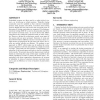Free Online Productivity Tools
i2Speak
i2Symbol
i2OCR
iTex2Img
iWeb2Print
iWeb2Shot
i2Type
iPdf2Split
iPdf2Merge
i2Bopomofo
i2Arabic
i2Style
i2Image
i2PDF
iLatex2Rtf
Sci2ools
124
click to vote
GECCO
2006
Springer
2006
Springer
Improving evolutionary real-time testing
Embedded systems are often used in a safety-critical context, e.g. in airborne or vehicle systems. Typically, timing constraints must be satisfied so that real-time embedded systems work properly and safely. Execution time testing involves finding the best and worst case execution times to determine if timing constraints are respected. Evolutionary real-time testing (ERTT) is used to dynamically search for the extreme execution times. It can be shown that ERTT outperforms the traditional methods based on static analysis. However, during the evolutionary search, some parts of the source code are never accessed. Moreover, it turns out that ERTT delivers different extreme execution times in a high number of generations for the same test object, the results are neither reliable nor efficient. We propose a new approach to ERTT which makes use of seeding the evolutionary algorithm with test data achieving a high structural coverage. Using such test data ensures a comprehensive exploration o...
Related Content
| Added | 23 Aug 2010 |
| Updated | 23 Aug 2010 |
| Type | Conference |
| Year | 2006 |
| Where | GECCO |
| Authors | Marouane Tlili, Stefan Wappler, Harmen Sthamer |
Comments (0)

